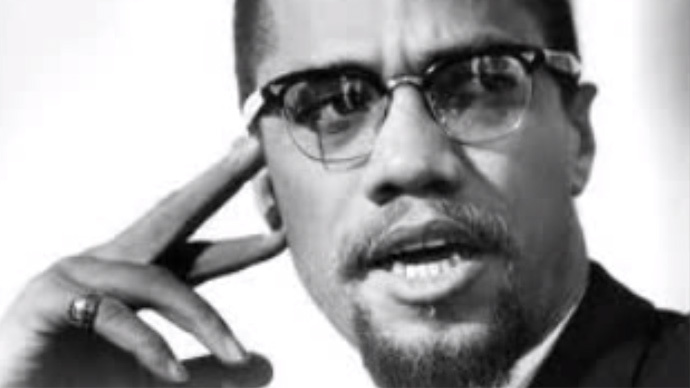Malcolm X’s message of liberation resonates today

Today, with police violence and discrimination against African Americans proliferating, the world celebrates the legacy of one of the greatest black leaders to have ever lived, Malcolm X, who was born on May 19, 1925.
Malcolm X, one of the most influential figures of recent history, developed an uncompromising political strategy based on studying the revolutions of oppressed peoples of color around the globe. Malcolm advised his followers to "examine the historic method used all over the world by others who have a similar problem to yours.”
Malcolm matched his political approach with an unrivalled ability to articulate the political demands of African Americans, evoking a style of speech that drew large audiences, and which resonated deeply with many people. His message still resonates today, and does so because it describes the condition of so many people in America, and elsewhere in the world.
Many of Malcolm's speeches and phrases became widely known, most notably the idea that advised “by any means necessary," which many years after his death remains the tactic and methodology needed in the fight for self-determination worldwide.
Where many leaders sold out, it was Malcolm's belief that freedom must and could only be achieved by such methods, and this approach set him apart from his contemporaries of the same era. Indeed, it was this steadfast belief that freedom must be achieved "by any means necessary" that ultimately led to his death, as his unflinching stance ensured that a clash with the empire became inevitable.
By the time he was assassinated in 1965, Malcolm X had already established his place as one of the most effective leaders of modern times. He had become a bridge, so to speak, connecting the plight of African Americans in the US with the plight of Africans in Africa. He emboldened Africans at home and abroad with an all-encompassing style of Pan-African internationalism.
And it was at this point in his life that Malcolm had become far too much of a threat to the social hierarchy, prevailing order, and political agenda of the United States. He advocated on behalf of separate political movements, with similar aims, but nonetheless exclusive of each other. However, a potentially unified global movement threatening the hegemonic power and dominance of the US and other Western nations could not be tolerated.
Throughout his life, Malcolm had ultimately remained committed to the liberation of not just African Americans, but of all Africans and peoples of color. He remained uncompromising in his belief that it was only through identifying the African American struggle as part of the broader struggle of the entire Global South that freedom could be achieved.
Since Malcolm was an African American, an internationalist and a socialist many different groups want to claim him as their own. But he was no pacifist or liberal - he was a revolutionary. The word 'evolution' within the word 'revolution' is relevant here. Malcolm's position evolved and matured over time into one that articulated his own peoples’ struggle within the wider context of an international struggle for justice and self-determination for all people living under an "International Western Empire.”
But Malcolm's commitment first and foremost was to the liberation of African Americans in the United States, the land of his birth. Taken from us too soon, we can only wonder what might have been achieved had Malcolm lived longer. Indeed, at the time of his assassination, he was clearly identifying and working closely with African leaders - and many others for that matter - in developing a unified strategy to topple and break the global system of ‘white supremacy.’

Today on Malcolm's birthday, and 50 years after his death, what has really changed?
Black people are still being murdered on the streets of America, in the so-called land of the free. The police are brutalizing African American communities with impunity in places like Ferguson, only now the issue is laid bare for all to see and it cannot being ignored. That is because many of the instances of callous murder and violence at the hands of the police are being caught on camera and shared on the internet. Examples of such violence seem almost daily occurrences now and they simply cannot be ignored. They reveal the ugly scar and reality of entrenched racism, and remind us that the idea of a post-racial political utopia in so-called 'civilized' nations is false. The reality of racism in nations that proclaim liberty shatters the myth that some so-called democratic nations are more 'civilized' than other 'barbaric' nations without democracy.
And what of Black leadership in the United States?
Barack Obama as the first Black President of the United States does not have the power or the will to change things. Obama did not create the state of race relations in the US, and the responsibility in dealing with it is by no means entirely his. However, as arguably the most powerful man on earth, his inability to counter the systemic violence against African Americans reflects the severity of the problem. Moreover, things may have gotten worse since the beginning of his leadership, further highlighting the insignificance of a black president at the head of a racist machine both at home and abroad.
Since Obama's election, the US has invaded Africa, as well as 'interventions' elsewhere, with Africans and other dark-skinned people paying the price for Western-exported democracy with their own blood. The trajectory of US foreign policy has continued along a straight line irrespective of leadership for many decades. At the same time, black people in the United States are treated with the same disregard as black and brown people caught by US foreign policy.
Meanwhile, the American media continue to justify the murder of African American men and even boys as part of the cultural narrative. At the same time, the private prison system has ushered in a new form of modernized and accepted slavery - a lucrative enterprise that depends on a racist narrative prevailing.
For the many groups of people who claim Malcolm, they ignore the fact that he identified with all of those subjected to oppression, not just some of them. In 2011, Libya was destroyed with black people being murdered because they were Black - as a direct result of the violence unleashed by NATO and its proxies.
Sadly, many who will celebrate Malcolm's birthday would rather remain silent on issues such as Libya. Too many people would rather side with a Black president and government and by default the other nations that backed the invasion. France, for example, played a key role in the invasion of Libya. Perhaps it is no coincidence that it also had banned Malcolm from travelling to France in keeping with the French government's tradition of trampling political dissent. A more recent example of this tradition being enforced can be seen with the French government's banning of Palestinian protests, while simultaneously allowing war criminals to parade through Paris's streets in a fake display of crocodile tears.
Anyone who respects Malcolm X for his leadership and achievements should celebrate his legacy by being as consistent as he was in rejecting the oppression of all people. Today, the tenets of modern Neo- Liberalism stipulates - in contrast to great leaders like Malcolm who were uncompromising - that it is somehow now okay for us to accept the slaughter of innocents under a liberal pretext. This thinking must be discarded. Malcolm certainly would not be calling for Hillary to be president; he'd be advocating instead for the full freedom and liberty of Assata Shakur (Shakur is an African-American activist and member of the former Black Panther Party (BPP) and Black Liberation Army (BLA). In the early 1970s, she was accused of killing a state trooper, among other serious crimes, and was the subject of a multistate manhunt. She was arrested, but escaped from prison in 1979 and fled to Cuba in 1984. In 2013, the FBI added her to the Most Wanted Terrorist List; the first woman included on the list.
Perhaps the best way of celebrating Malcolm X's birthday is by continuing his legacy based on what he stood for, not some watered down, sanitized version of reality. After all, he advocated a political long-term strategy based on understanding and working with those revolutions born out of all forms of oppression and subjugation. Given that the empire continues to divide and rule, the importance of this thinking remains as relevant as ever.
The statements, views and opinions expressed in this column are solely those of the author and do not necessarily represent those of RT.
The statements, views and opinions expressed in this column are solely those of the author and do not necessarily represent those of RT.













